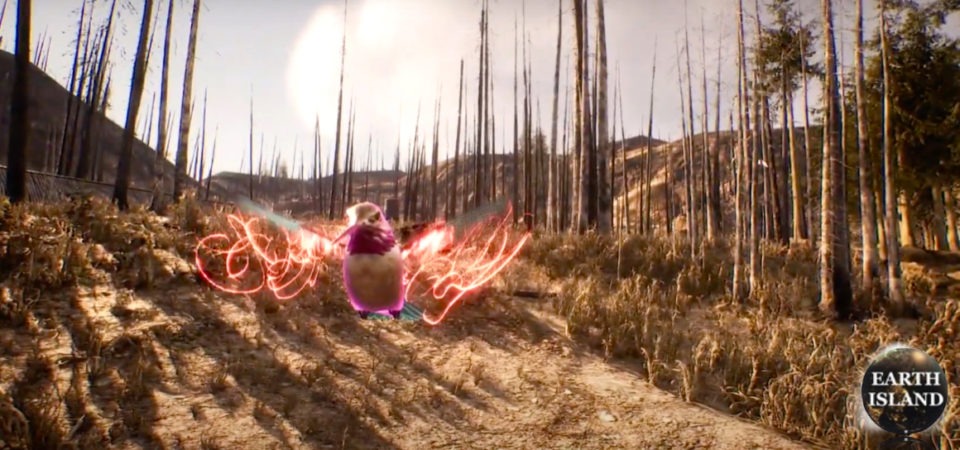On video games, the climate crisis, and the ecology of fragmentation
Animals are divided into (a) belonging to the Emperor, (b) embalmed, (c) tame, (d) sucking pigs, (e) sirens, (f) fabulous, (g) stray dogs, (h) included in the present classification, (i) frenzied, (j) innumerable, (k) drawn with a very fine camelhair brush, (l) et cetera—Michel Foucault, The Order of Things
On my desk, by my computer, I have laid out certain objects: a dice, a shell, a spinning top, a piece of sea glass, a rusted chain I found on a beach. I like having them around. I take care of them. These objects have their evocative power to which I’m attuned. However, they also speak of something else: a causal system underlying their presence, in this case, a realm of emotions adjacent to longing.
Appearing disjoined on the surface, they are joined at the depths. Our current approach to climate regeneration can also manifest as surreally fragmented. Consider just a few instances of ecological interventionism: madly proliferating Asian carp, bubble machines, diamond dust clouds, vegan dogs, 163 Nevada pupfish. We can venture a guess that there is a connective tissue to these phenomena, which may have something to do with our wanting to protect nature lest we die. But is that all? Shouldn’t we dig deeper?
In The Order of Things, Michel Foucault proposes that systems of coherence underlying the operations of culture are buried deep but worth unearthing nonetheless, such a deep analysis is crucial to a meaningful action in the social sphere. Beleaguered by the complexity of issues surrounding the climate, most of us still don’t know what to do with all the disaster-related information that inundates us. Recycle better? Wear hemp?
We gain little relief from the often-tragicomic displays of technological hubris, which give us bubble machines fighting carp. So perhaps we can pause and ask if any useful, overwhelm-abating insights can come from a deep dive into the underlying strata of whatever puts this or that solution on the desk of an environmentalist.
It is quite possible that in the quest for solutions, we are missing something fundamental; as Foucault made it clear, the underlying epistemes are not easy to detect. But once they come into the open, we may know more about what actions to take in environmental scenarios because we will have discovered what lies at the root of how we function in our world.
However, my own opinion about what that might be is of limited consequence. Given the dire planetary situation, we need a public platform where the exploration of the underlying causes of our current crisis can occur on a mass scale, through a democratic process involving millions of people. Unrealistic? Maybe. But worth our best try if we want to effect change quickly. Not in thirty years. In a year or two. It’s that urgent.
Thus, video games. Broadly available to over three billion users, they give us a global platform ready to be activated. But can video games be used for the deep exploration of the collective unconscious? And can they subsequently illuminate a way forward? The answer may be yes if they are designed with that goal in mind.
Enter Earth Island, a video game. When you click ‘play’ you find yourself surrounded by a ruined ecosystem with remnants of oil derricks, abandoned farmhouses, burnt forests, a flooded city. No sign of humans.
Still, there is life. A spirit hummingbird flies to greet you and show you around. As you move about, here they come, the ghosts, the specters of the island’s former tenants, who, through their actions, contributed to its deterioration. The island’s indigenous people also appear, as do its animals, plants, and springs.
The player meets these ghosts, listens to their stories, and responds to their pleas. On Earth Island, the environmental crisis is not framed as an abstraction (through numbers and charts) nor as a doomsday adventure (through fires, floods, collapsing buildings, etc.) but it is lodged in the way we think and feel about our life on the planet through a one-to-one relationship with another: human, animal, plant, mountain, spirit. This personal focus soon exposes the paradigm of dominion and separation that thus far has been the mainstay of the Western cultural ethos, revealing how profoundly it has penetrated the individual experiences of both perpetrators and sufferers.
Appealing to more than a solution-driven mind, the island’s hauntings invite the player into the sphere of inter-being where empathy will have a chance to emerge and where subjective immediacy achieves power to motivate and affect action.
Why put ghosts in a game? For starters, they have much to teach us. Contrary to popular opinion, they are not dead. They come back from the dead to live among us, shedding light on our unresolved traumas. Consider Hamlet’s ghost. Or Dybbuk. Or so many others. The ghosts illuminate who we are by exposing what we have forgotten. And we don’t have to look for them in some distant past. The ghosts are our contemporaries, too. The iconoclastic priest and journalist Giles Fraser met a bunch of them following his resignation from Saint Paul’s Cathedral, which landed him on a therapist’s couch:
I believe in ghosts. I live with them all the time. But it wasn’t always the case. Foolishly, I used to pretend they didn’t exist, that the dead stayed dead, that they had no purchase on my life. But now I speak to them all the time and they speak to me. And I have even come to love them, in a strange kind of way. But I don’t call them ghosts. I call them memories, many half-buried, many faintly conceived. For one of the surprising things unearthed for me by the extraordinary chemistry of psychoanalysis was the continuing presence of my ancestors. Ghosts are psychological unfinished business, often associated with unprocessed pain.—Giles Fraser, The Guardian, 2015.
As a haunted ground, Earth Island can become a place where we can tend to our own ghosts. There, we can begin remembering what we have buried in response to cultural pressures, gaining clarity on why we got ourselves into the ecological crisis in the first place. There, we may uncover deep motivation to act on behalf of our planet because it will come alive for us not as an abstract site of scientific maneuverings but as an affect-drenched territory of aspirations, desires, fears, and projections, calling to us through spirit voices that are ultimately our own. We may reach for solutions to the crises—the gamers will try, that’s part of the fun—only to discover that these solutions are not all-encompassing, that they do not add up to some grand totality of a restored order, but rather that they function like pieces of an elusive puzzle that we will need to continue putting together for as long as we are around.
Still, albeit fragmented and incomplete, these puzzle pieces will be buoyed up—or so one can hope—by the energy of reckoning. From within the turmoil of fragmentation, something else may emerge bringing us the required strength: a desire for the restoration of resonant interconnectedness between humans and the ecosphere articulated in whispers of expectant ghosts. And we may discover that these very ghosts were always with us, leaving tokens of their presence in our paths: a shell, a polished piece of sea glass, a rusty chain. Yes, it is a ghost who has been yanking that chain on my desk, asking me to find the sunken ship’s bell from which it broke off, the ship full of untold stories. The shell? It ghosts the ocean’s songs, its curves reflecting life and death cycles happening in its depths, reminding me that the ocean is what I love.
The institutions of late capitalism that engulf us from all sides do not want us to feel much of anything. Sensitivity of any kind—emotional, perceptual, intellectual—does not fare very well in the structures of commodification, consumerism, overproduction, and exploitation. As Morris Berman points out in The Reenchantment of the World, global economies rely on the dead and unfeeling world.
And yet, we resist that deadening by choosing to live among treetops in defiance of logging, laying down on the road in front of the machine, and tying ourselves to factories’ gates. One tree can wake us up. One bird. A handful of ancient seeds can do that as well. The scientists defending the 163 pupfish living in Devil’s Hole—a narrow, deep pool burrowed within the rocks of Death Valley—combat obstacles worthy of Superman trying to protect the fish from water companies, vandals, earthquakes, and the Supreme Court. They are winning. The fish have come back from the brink of extinction. They are silvery blue and playful as kittens. The scientists are attached. Love: a fundamental episteme of environmentalism. No wonder it’s buried. It hurts to remember what we have lost. Still, it is the strongest force in the world. Unleash it, and the world may change.
 Aleksandra Wolska, P.h.D., is a theater artist, playwright, filmmaker, and scholar of performance. She directed numerous productions from Shakespeare to Beckett to devise works for the stage; her All Wear Bowlers with Rainpan43 achieved international acclaim. Dr. Wolska taught at the University of Minnesota (Assistant Professor) and Stanford Summer Institute and conducts performance workshops in the US and abroad. She is a founder/artistic director of Theater Between. Her current work centers on embodiment, performance, and ecology. https://www.earthislandgame.com.
Aleksandra Wolska, P.h.D., is a theater artist, playwright, filmmaker, and scholar of performance. She directed numerous productions from Shakespeare to Beckett to devise works for the stage; her All Wear Bowlers with Rainpan43 achieved international acclaim. Dr. Wolska taught at the University of Minnesota (Assistant Professor) and Stanford Summer Institute and conducts performance workshops in the US and abroad. She is a founder/artistic director of Theater Between. Her current work centers on embodiment, performance, and ecology. https://www.earthislandgame.com.
The MAHB Blog is a venture of the Millennium Alliance for Humanity and the Biosphere. Questions should be directed to joan@mahbonline.org
The views and opinions expressed through the MAHB Website are those of the contributing authors and do not necessarily reflect an official position of the MAHB. The MAHB aims to share a range of perspectives and welcomes the discussions that they prompt.
